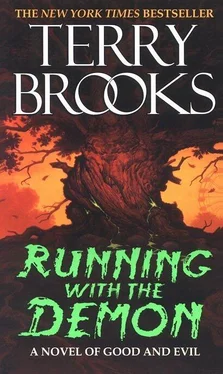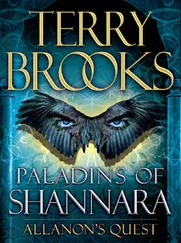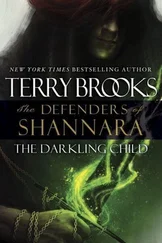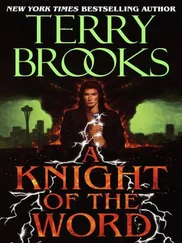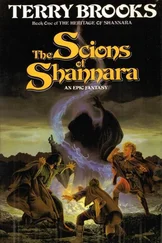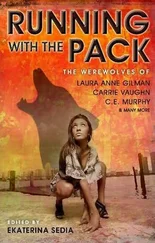"Some of those people you talk about live right here in Hopewell." Penny Williamson grunted. "That Topp kid who killed his common–law wife with a butcher knife and cut her up in pieces a few years back? I grew up with that kid. Old man Peters killed ail those horses two weeks back, said they were the spawn of Satan. Tilda Mason, tried to kill herself three rimes over the past six months–twice in the mental hospital. Tried to kill a couple of the people working there as well. That fellow Riley Crisp, the one they call 'rabbit' lives down on Wallace? He stood out on the First Avenue Bridge and shot at people until the police came, then shot at them, and then jumped off the bridge and drowned himself. When was that? Last month?" He shook his head. "Where's it all going to end I wonder?"
Old Bob smoothed back his white hair. None of them had the answer to that one. It made him wonder suddenly about Evelyn and her feeders. Might just as easily be feeders out there as something the government had put in the water.
He noticed suddenly that the man who had been sitting with Deny Howe was gone. His brow furrowed and his wide mouth tightened. When had the man left? He tried again to think of his name and failed.
"I got me some more work to do out at Preston's," Richie Stoudt advised solemnly. "You can laugh, but it keeps bread on the table."
The conversation returned to the strike and the intractable position of the company, and the stories started up again, and a moment later Old Bob had forgotten the man completely.
The demon stepped out into the midday heat in front of Josie's and felt right at home. Perhaps it was his madness that made him so comfortable with the sun's brilliant white light and suffocating swelter, for it was true that it burned as implacably hot. Or perhaps it was his deep and abiding satisfaction at knowing that this community and its inhabitants were his to do with as he chose.
He followed Derry Howe and Junior El way to the latter's Jeep Cherokee and climbed into the cab with them, sitting comfortably in the backseat, neither one of them quite aware that he was there. It was one of the skills he had acquired–to blend in so thoroughly with his surroundings that he seemed to be a part of them, to make himself appear so familiar that even those sitting right beside him felt no need to question his presence. He supposed there was still just enough of them in him that he was able to accomplish this. He had been human once himself, but that was long ago and all but forgotten. What remained of his humanity was just a shadow of a memory of what these creatures were, so that he could appear and act like them to the extent that his duplicity required it. His gradual transformation from human to demon had driven out the rest. He had found, after a time, that he did not miss it.
Junior turned over the Jeep's engine and switched on the air, blowing a thick wash of heat through the vents and into the closed interior. Junior and Derry rolled down their windows to let the heat escape as the Jeep pulled away from the curb, but the demon just breathed in contentedly and smiled. He had been in Hopewell a little more than a week, not wanting to come any sooner because John Ross still tracked him relentlessly and had displayed a disturbing ability to locate him even when there was no possible way he should have been able to do so. But a week had gone by, the Fourth of July approached, and it seemed possible that this time Ross might prove a step too slow. It was important that Ross not interfere, for the demon had sown his destructive seed deep and waited long for it to grow. Now the seed's harvest was at hand, and the demon did not want any interference. Everything was in place, everything that he had worked so long and hard to achieve-a clever subterfuge, an apocalyptic ruin, and an irreversible transformation that would hasten the coming of the Void and the banishment of the Word.
His mind spun with the possibilities as the Jeep turned off Second Avenue onto Fourth Street and headed west out of town. On his left the long, dark, corrugated–metal roofs of Mid‑Con Steel could be glimpsed through gaps in the rows of the once–elegant old homes that ran the length of West Third coming in toward town from several blocks above Avenue G. The air–conditioning had kicked in, and with the windows rolled up again the demon took comfort instead from his inner heat. His passion enveloped him, a cocoon into which he could retreat and from which he could feed, a red haze of intolerance and hate and greed for power.
"Those old boys don't know nothing," Derry Howe was saying, slouched back in his bucket seat, his bullet head shining in the sun. "I don't plan to listen to them no more. All they do is sit around and talk about sitting around some more. Old farts."
"Yeah, they ain't seeing it like it is," Junior agreed.
No, not like you, thought the demon contentedly. Not with the bright, clear knowledge I have given to you.
"We got to do something if we want to keep our jobs," Derry said. "We got to stop the company from breaking the union, and we got to stop them right now."
"Yeah, but how we gonna do that?" Junior asked, glancing over uncertainly, then gunning the Jeep through a yellow light turning red.
"Oh, there's ways. There's ways, buddy."
Yes, there are lots and lots of ways.
Derry Howe looked over at Junior, smiling. "You know what they say? Where there's a will, there's a way. Well, I've got me a will that won't quit. I just need me a way. I'm gonna find it, too, and you can take that to the bank! Old Bob and those others can go shove their patience where the sun don't shine."
They crossed Avenue G past the tire center, gas station, and west–end grocery and rode farther toward the cornfields. The buildings of the mill were still visible down the cross streets and between the old homes, plant three giving way to plant four, plant five still out ahead, back of the old speedway, the whole of MidCon spread out along the north bank of the Rock River. The demon studied the residences and the people they sped past, his for the taking, his to own, dismissing them almost as quickly as they were considered. This was a breeding ground for him and nothing more. On July fourth, all of it and all of them would pass into the hands of the feeders, and he would be on his way to another place. It was his world, too, but he felt no attachment to it. His work was what drove him, what gave him purpose, and his servitude to the dark, chaotic vision of the Void would allow for nothing else. There were in his life only need and compulsion, those to be satisfied through a venting of his madness, and nothing of his physical surroundings or of the creatures that inhabited them had any meaning for him.
The Jeep passed a junkyard of rusting automobile carcasses piled high behind a chain–link fence bordering a trailer park that looked to be the last stop of transients on their way to homelessness or the grave, and from behind the fence a pair of lean, black–faced Dobermans peered out with savage eyes. Bred to attack anything that intruded, the demon thought. Bred to destroy. He liked that.
His mind drifted in the haze of the midday summer heat, the voices of Derry and Junior a comfortable buzz that did not intrude. He had come to Hopewell afoot, walking out of the swelter of the cornfields and the blacktop roadways with the inexorable certainty of nightfall. He had chosen to appear in that manner, wanting to smell and taste the town, wanting it to give something of itself to him, something it could not give if he arrived by car or bus, if he were to be closed away. He had materialized in the manner of a mirage, given shape and form out of delusion and desperation, given life out of false hope. He had walked into a poor neighborhood on the fringe of the town, into a collection of dilapidated homes patched with tar paper and oilcloth, their painted wooden sides peeling, their shingled roofs cracked and blistered, their yards rutted and littered with ruined toys, discarded appliances, and rusting vehicles. Within the close, airless confines of the homes huddled the leavings of despair and endless disappointment. Children played beneath the shade of the trees, dust–covered, desultory, and joyless. Already they knew what the future would bring. Already their childhood was ending. The demon passed them with a smile.
Читать дальше
